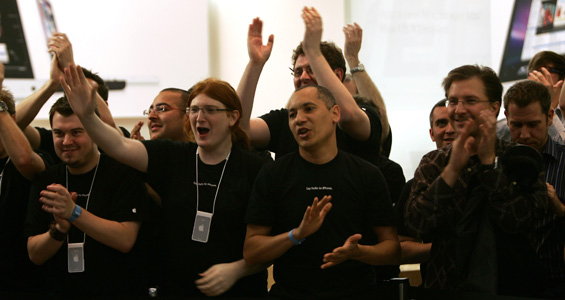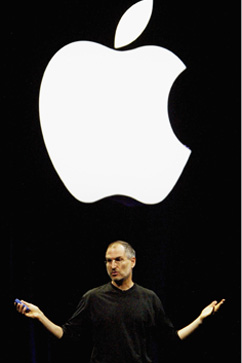The cult of Apple
As iPad hits the stores, Al Jazeera looks at why customers are so fanatically devoted to Apple products.

 |
| Apple products inspire strong feelings from those who use them [GALLO/GETTY] |
Under the blue skies of Western California lie the headquarters of a multi-billion dollar institution with a global army of loyal supporters.
It is an organisation built around one man’s vision, is obsessed with secrecy, and many of its followers could fairly be described as devotees.
Keep reading
list of 4 itemsHong Kong’s first monkey virus case – what do we know about the B virus?
Why will low birthrate in Europe trigger ‘Staggering social change’?
The Max Planck Society must end its unconditional support for Israel
No, it is not the Church of Scientology. It is Apple, the computing and technology giant seeking (once again) to redefine the way we use electronic devices.
After months of hype the iPad, Apple’s new touch-screen tablet computer, is finally available in stores across America. Early reviews have been positive; the Wall Street Journal is calling it a “game-changer”, USA Today says the iPad is “rewriting the rulebook”.
One New York Times technology correspondent waxed so lyrical about the device that a popular computing blog teasingly accused him of having “intimate encounters with his iPad”.
Such powerful responses to Apple’s products are nothing new. We know there is something about the company that can persuade people to queue for hours in order to spend hundreds of dollars on a device they never knew they needed; but what is it?
Lifestyle choice
Experts believe the secret of Apple’s success is simple. “They are awesome products,” says Leander Kahney, author of two books on Apple, and editor of the popular Cult of Mac blog.
“They are magical in the true sense of the word.”
 |
| Steve Jobs: messiah? [GALLO/GETTY] |
He says that Apple devices capture the imagination of their users in a way that is unique in the technology sector.
“People become very invested in the products. It’s a lifestyle choice for people; being a Mac-user is like owning a Harley. These people would be embarrassed to sit in a coffee shop and open a Dell,” he says.
Using a Mac allows people to buy into an image: from the “Designed in California” legend that appears on all Apple products to the “think different” advertising campaign that helped to establish the company’s position. Apple projects an alternative, individualistic message that resonates with its customers.
At times, outsiders may find Mac-users’ commitment to the Apple products baffling.
“It has cultish aspects,” Kahney admits.
“But to say it’s just cultish devotion dismisses the company and its achievements. Apple has created the perfect blend of technology and marketing.”
But others have suggested there is more to Apple than well-made, well-promoted products.
A 2005 study by Russell Belk, a Utah-based consumer psychologist, entitled the Cult of Macintosh, identified “quasi-religious aspects” in the relationship between the company and its customers.
“We find several key sustaining myths, including a creation myth, a messianic myth, a satanic myth, and a resurrection myth,” an introduction to the report said.
It may sound far-fetched to suggest that people believe that Apple has risen from the dead to engage in a titanic struggle with the dark forces of Microsoft, or that the Mac faithful are being guided to salvation by the enlightened message of Steve Jobs.
But a trip to an Apple store, with their crowds of uber-cool Mac-users milling around, and their hushed, reverential atmosphere, can feel like a visit to some sort of temple.
Tech-world darling
Chuq von Rospach, a former Apple employee, says that working for the company had parallels with following a religion.
“I still feel like I celebrate two Christmases: the one I celebrate with my family, and the one in January that we celebrate when Steve Jobs gets up on stage and says: ‘I have a few things to show you today that I think you’ll really like,’ he said in an article in The Guardian last year.
|
“The things people associate with the brand are liberty, creativity and a sense of individuality” Leander Kahney, editor of Cult of Mac blog |
Apple’s position as the darling of the tech world is reflected by its presence in popular culture, particularly in films and television programmes.
Of the 44 films that topped the box office for at least one weekend in the US last year, Apple products were featured in 18 of them, making it the number one brand featured in US blockbuster movies in 2009.
It is a reflection of what is perhaps Apple’s most valuable commodity; it is as “cool” as PC products are “square”.
Despite grumblings about the company seeking to exert too much control over the software available for its devices, people still see using Apple machines as anti-corporate and emancipating, a means to challenge the dreary world of the PC.
The launch of the iPad is the latest chapter in a narrative that Apple has been crafting for decades, and the company believes it may be the most “revolutionary” device it has yet produced. But certain elements of the iPad will no doubt be familiar to Apple aficionados.
“The things that people associate with the brand are liberty, creativity and a sense of individuality,” author Kahney says.
The iPad’s success will depend as much on who it appeals to as it does on how well it works. If it comes to embody values that trend-setters can buy into, the “Cult of Apple” looks set to go from strength to strength.